As a BetterHelp affiliate, we receive compensation from BetterHelp if you purchase products or services through the links provided
Are you feeling stressed lately? You’re not alone. Many people struggle with stress and its impact on their bodies, especially stress hormones like cortisol. High levels of these hormones can affect mood, sleep, and even weight.
Fortunately, research shows that mindfulness-based practices such as meditation can effectively reduce stress and lower cortisol levels.
This blog post will offer practical strategies for managing stress hormones for a healthier you. From adjusting your diet to adopting new relaxation techniques, we have gathered evidence-based methods that have proven effective.
By the end of this article, you’ll have several tools to help you manage your stress and improve your overall well-being. Ready to feel better?
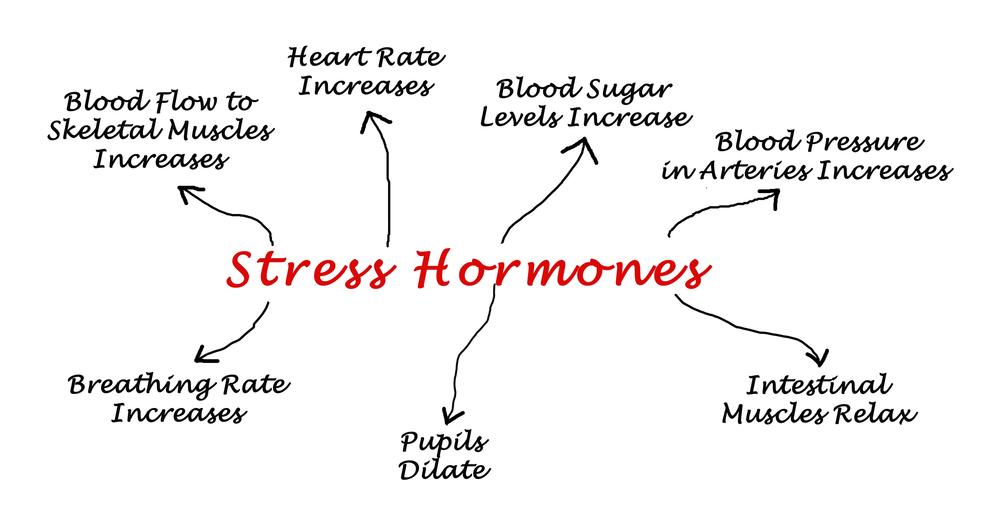
Natural Stress Relief Methods
When stress levels rise, our bodies release hormones like cortisol and adrenaline to help us deal with perceived threats. While these hormones can be beneficial in the short term, chronic stress leads to excessive hormone production, which can negatively impact our physical and mental health.
Fortunately, several natural methods can help reduce stress hormone levels and promote well-being.
Exercise is a powerful stress-relief tool. Physical activity releases endorphins, the body’s natural feel-good chemicals, and can help lower cortisol levels. Even moderate exercise, such as brisk walking or yoga, can be effective.
Mindfulness practices like meditation and deep breathing exercises can also help reduce stress hormones. By consciously focusing on the present moment and regulating your breathing, you can activate the parasympathetic nervous system, which promotes relaxation and counteracts the stress response.
Getting enough quality sleep is crucial for managing stress. Lack of sleep can disrupt hormone balance and exacerbate stress levels.
Establishing a consistent sleep routine, optimizing your sleep environment, and practicing good sleep hygiene can help improve the quantity and quality of your rest.
Engaging in enjoyable hobbies, spending time in nature, and nurturing social connections are additional natural stress-relief strategies. By incorporating these methods into your daily routine, you can actively work towards reducing stress hormone levels and cultivating a healthier, more balanced lifestyle.
Effective Stress Hormone Reduction Techniques
Implementing targeted techniques can be highly beneficial in combating the negative effects of chronic stress and excessive stress hormone production. One powerful approach is cognitive-behavioral therapy (CBT), which helps identify and modify thought patterns and behaviors contributing to stress.
CBT equips individuals with coping strategies and relaxation techniques, such as progressive muscle relaxation and guided imagery.
Additionally, certain supplements and herbs have been shown to have stress-reducing properties. Adaptogens like ashwagandha and rhodiola can help regulate cortisol levels and promote a balanced stress response. Chamomile, lavender, and valerian root are also known for their calming effects and ability to promote relaxation.
Incorporating stress management practices into your daily routine is essential for maintaining healthy stress hormone levels. Experiment with different techniques and find the combination that works best for you. Consistency and commitment to these practices can significantly improve your overall well-being and resilience to stress.
Managing Stress Through Lifestyle Changes
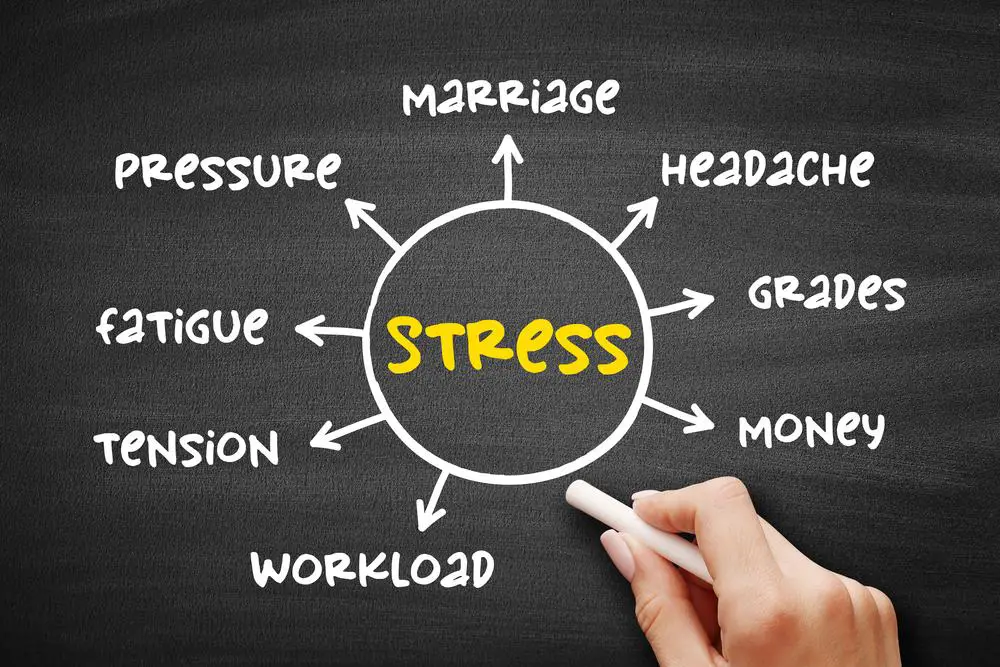
Transitioning from specific stress hormone reduction techniques to broader lifestyle changes offers a seamless way to integrate stress management into everyday life. Healthy daily habits can significantly lower cortisol levels and enhance your well-being.
Incorporate mindfulness practices like meditation and yoga into your routine, which have been proven effective in reducing stress hormones. Prioritize a whole, plant-based diet that fuels your body with the right nutrients while minimizing caffeine intake to keep cortisol at bay.
Regular physical activity lowers stress and prevents serious health issues linked to elevated cortisol levels, such as heart disease and obesity.
Simple adjustments like laughing more, connecting with loved ones, or keeping a gratitude journal immensely lower stress hormones and boost emotional wellness.
Stress Hormone Reduction: Tips And Tricks
While stress is an inevitable part of life, there are simple yet effective tips and tricks to help keep stress hormones like cortisol and adrenaline in check. One easy technique is practicing deep breathing exercises, which can quickly activate the relaxation response and counteract the stress response.
Incorporating short breaks into your day can also be beneficial. Step away from your work or task for a few minutes to stretch, take a brief walk, or change your scenery. These mini-breaks can help reset your mind and prevent stress from building up.
Laughter and positive social interactions have been shown to reduce stress hormone levels. Make time for activities that bring you joy and connect with supportive friends or family members. Engaging in hobbies or creative pursuits can also provide a healthy outlet for stress relief.
Finally, prioritizing self-care is crucial. Ensure you sleep well, maintain a balanced diet, and exercise regularly. Small lifestyle adjustments can go a long way in managing stress hormone levels and promoting overall well-being.
Holistic Approaches To Lowering Stress Hormones
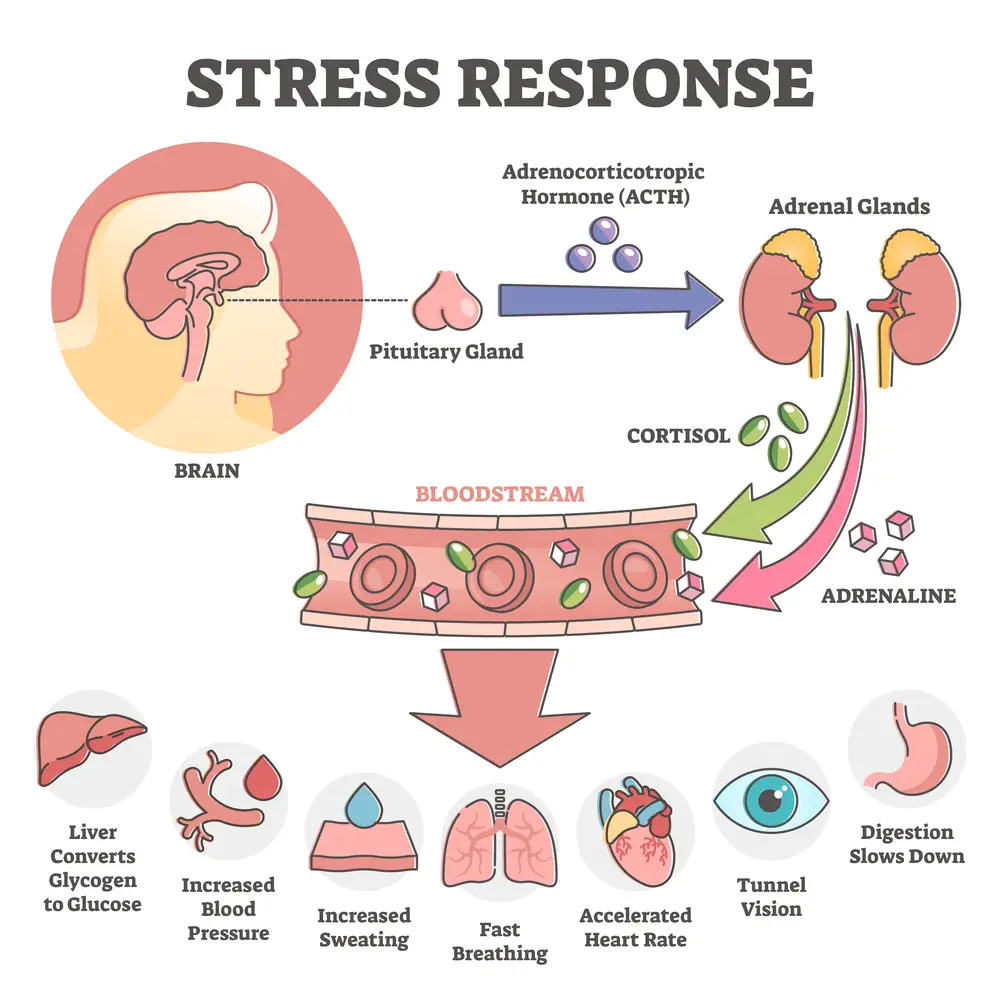
Adopting a holistic approach to managing stress hormones involves intertwining physical, emotional, and nutritional strategies into daily life. Engaging in mindfulness practices like meditation has effectively lowered cortisol levels, promoting a sense of calm and reducing overall stress.
Mindfulness encourages you to live in the present moment, helping break the cycle of worry and anxiety that often fuels stress hormone spikes. This method seamlessly integrates with breathing exercises, enhancing relaxation techniques that can further decrease tension throughout the body.
Incorporating yoga or other forms of mindful movement into your routine is a powerful ally in balancing cortisol levels. These activities improve physical strength and flexibility and support mental health by fostering an inner peace that counteracts stress’s negative impacts.
Eating a balanced diet plays a crucial role, too; opting for whole, plant-based options nourishes the body and stabilizes mood fluctuations associated with diet-induced stress responses.
Coupling these dietary habits with regular physical exercise and laughter—nature’s stress relief—creates a comprehensive self-care strategy to maintain hormonal balance and enhance overall well-being.
Simple Ways To Reduce Stress Hormones
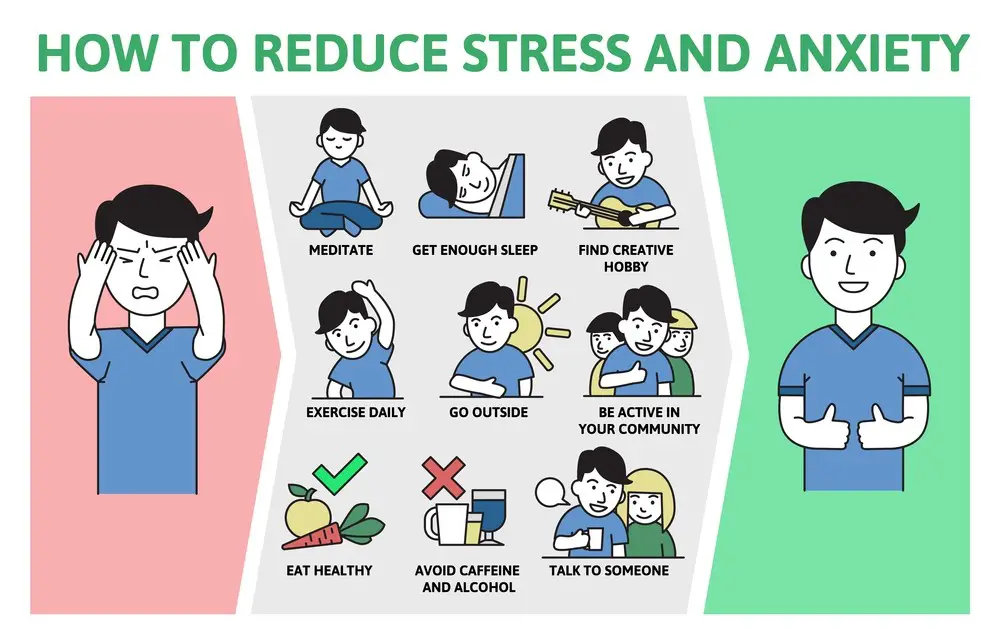
Effectively managing stress hormones like cortisol and adrenaline doesn’t have to be complicated. Several simple yet powerful strategies can be incorporated into your daily routine to promote a healthier stress response.
One straightforward approach is to prioritize good sleep hygiene. Aim for 7-9 hours of quality sleep each night, and establish a relaxing pre-bedtime routine to help you wind down. Adequate sleep is crucial for regulating hormone levels and overall well-being.
Staying hydrated and nourishing your body with a balanced diet rich in whole foods can also help reduce stress hormone levels. Avoid excessive caffeine, alcohol, and processed foods, which can exacerbate stress.
Exposure to nature has been shown to have a calming effect on the mind and body. Take a daily walk outdoors, or spend a few minutes each day in a green space or garden. The fresh air and natural surroundings can work wonders for stress relief.
Remember, small, consistent steps can make a significant difference in managing stress hormones. Experiment with different techniques and find the best strategies for your lifestyle and needs.
Quick Stress Hormone Reduction Methods
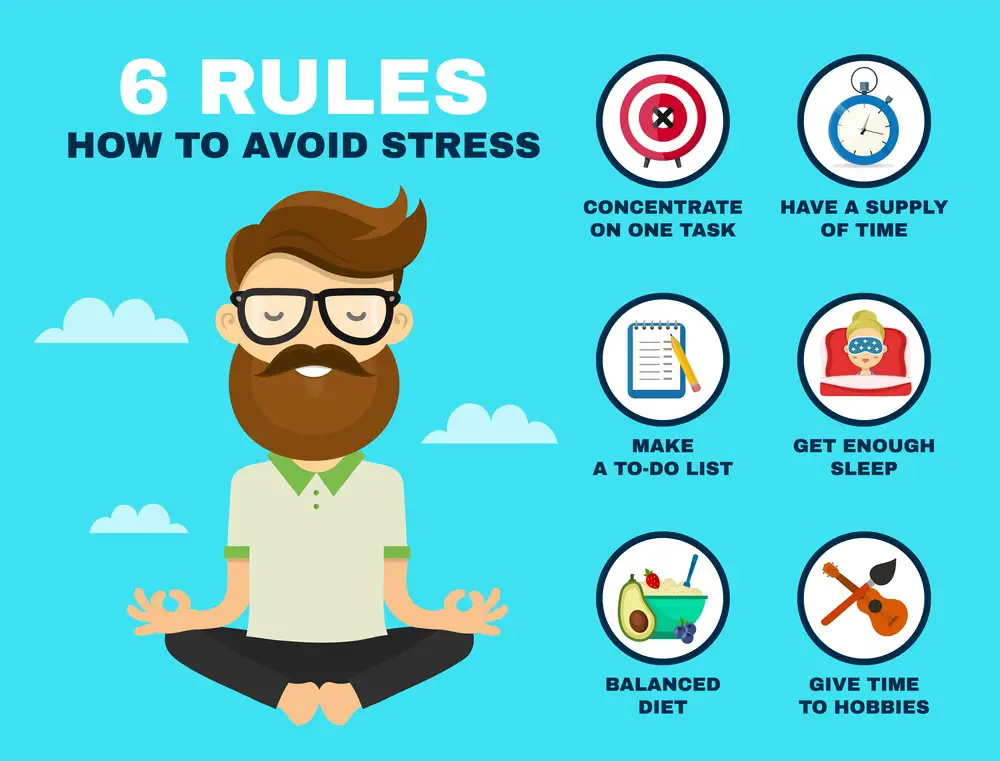
In moments of acute stress, it’s important to have quick techniques at your disposal to help lower stress hormone levels. One effective method is box breathing – inhale for four counts, hold for four counts, exhale for four counts, and hold for four counts. Repeat as needed.
Progressive muscle relaxation, where you systematically tense and release different muscle groups, can also provide fast relief. Squeezing a stress ball or taking a short walk can help release pent-up tension.
When you need an immediate reset, try splashing cool water on your face or inhaling calming essential oils like lavender or bergamot. These simple, accessible methods can rapidly activate the relaxation response and counteract stress hormones.
Techniques For Balancing Stress Hormones
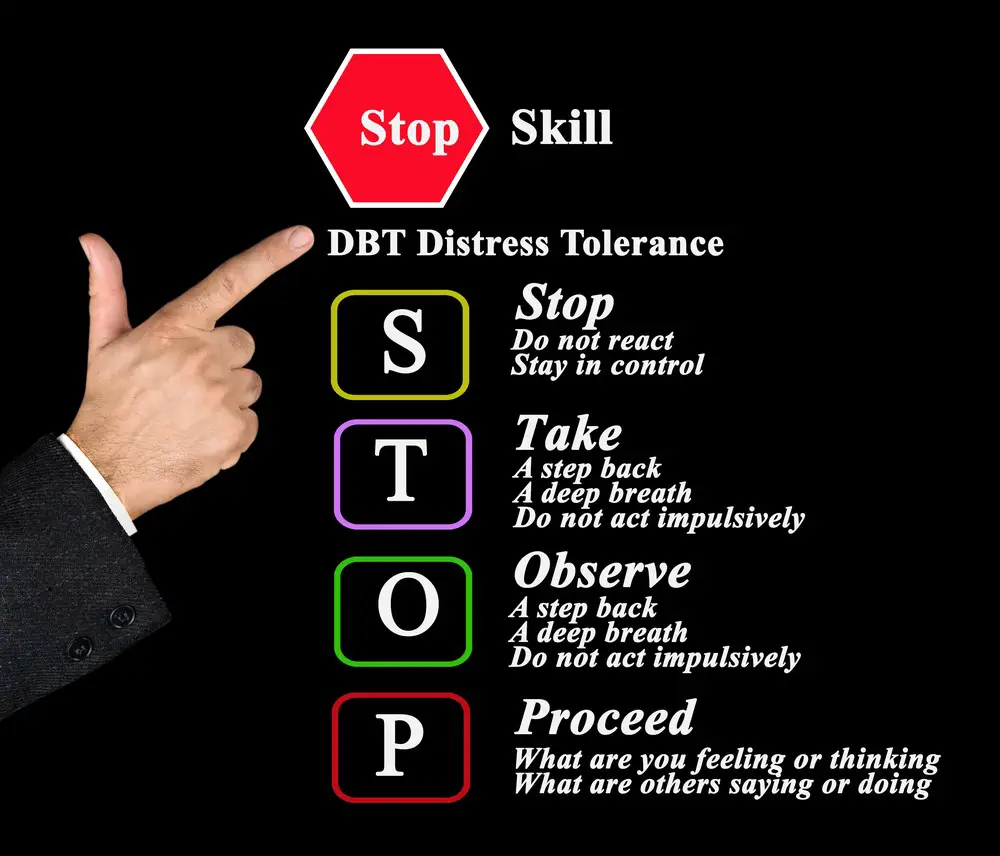
After exploring quick methods to lower stress hormones, it’s essential to delve into techniques focusing on long-term balance.
Practicing mindfulness and meditation can significantly reduce stress levels, directly decreasing cortisol production. Regularly engaging in these practices helps calm the mind and stabilizes emotional reactions, contributing to a healthier hormonal balance.
Incorporating yoga or other forms of mindful movement into your daily routine is an effective strategy for managing stress and maintaining equilibrium among your stress hormones.
Eating a balanced diet rich in whole foods while limiting caffeine intake is crucial in keeping cortisol levels in check. Supplements designed for stress management may offer additional benefits by supporting the body’s natural ability to regulate hormone levels, ensuring a comprehensive approach to achieving hormonal harmony and fostering overall well-being.
- 7 Ideas to Help You Relax and Unwind on a Family Vacation - April 27, 2025
- How Having Cybersecurity Protection Helps You Relax - April 25, 2025
- 8 Reasons Why Spending Time Outside Calms You Down - April 25, 2025
This site contains affiliate links to products. We will receive a commission for purchases made through these links.





